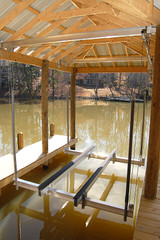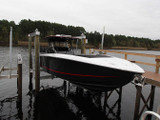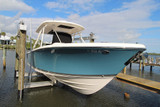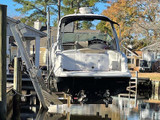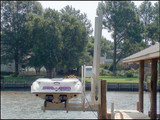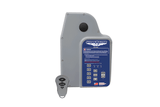SKU:
Pre-Cut Boat Lift Cables
Write a Review
Pre-Cut Boat Lift Cables
Safe payments with trusted SSL protection
-
Stainless Steel replacement cable can help you repair your lift. The pre-cut cable comes in 1/4 inch and 5/16 inch, with or without a hardeye. Comes in various lengths.
Both types of cable:
- commonly used for boat lifts
- Provide moderate corrosion resistance
- Remain ductile over long periods while running over sheaves
- Requires compounding for boats weighing over 6,000 lbs.
- Do not rely on “breaking strength” when rating cable
- Galvanized steel cable is best used for freshwater applications and stainless steel cable is used best in saltwater applications.
Aircraft cable
Aircraft cable is a cable or wire rope specified by the number of strands in the wire rope times the number of wires in each strand. For example, 7×7 aircraft cable is made from 7 strands that each contain 7 wires, for a total of 49 wires. A 7×19 aircraft cable is made from 7 strands that each include 19 wires, for a total of 133 wires. This means a 7×19 construction consists of over 2.5 times the total number of wires as a 7×7.
Safe Working Load vs. Minimum breaking strength
Always use the Safe Working Load (SWL) of the cable rather than the breaking strength. Minimum breaking strength is how much force a newly woven wire rope can withstand under perfect conditions, while if you added one more pound the rope would snap.
As a system, the wire rope includes the wire rope itself as well as the end connections. Because the cable must bend around cables and sheaves they can only be as strong as their weakest link. Minimum breaking strength refers to the cable’s maximum tension under ideal circumstances without accounting for the other factors that compromise the system’s strength.
Safety factor and rating systems are based on the ASME (American Society of Mechanical Engineers) recommendations. The Safe Working Load includes a safety factor (SF) for all the things that can happen to wire rope during its useful life which may reduce its breaking strength. This is so that the lift can still safely support the load if at least one or more factors working to break the wire rope are present. Wire ropes deteriorate over time, lowering their breaking strength as they lose their safety factor.
Specifications
Lift Size 1 Part Straight Line 2 Part Compounded
2,800 lbs. 3/16 in. 3/16 in.
4,500 lbs. 1/4 in. 3/16 in.
6,000 lbs. 5/16 in. 1/4 in.
9,000 lbs. X 1/4 in.
10,000 lbs. X 1/4 in.
13,000 lbs. X 5/16 in.
16,000 lbs. X 3/8 in.
24,000 lbs. X 3/8 in.*In order to find out what size wire rope is required for your lift, you must first calculate the total weight to be lifted, including the “wet” weight of the boat, the maximum cargo that can be loaded into the boat, and the weight of the lifting cradle.
Boat
Fuel
Water (Ballast, live well, potable, etc.)
Any cargo items in the boat (Note: There should never be people in the boat while being lifted.)
Boat cradle and bunks
Typically, the weight specified by a boat manufacturer refers to its “dry” weight. In order to calculate the “wet” weight, you must include the fuel weight- (6.30 lb/US gal for gasoline and 6.94 for diesel), the water weight (8.34 lb/US gal) that may ever be present in the boat, and the estimated weight of the possible cargo (i.e., coolers, skis, fishing gear, etc.).Cable Ratings
Cable Size Cable Material Lifting Capacity Min. Breaking Strength Safe Working Limit Best Water Type 3/16 in. Stainless 925 lbs. * 3,700 lbs. 925 lbs. Saltwater 3/16 in. Galvanized 1,050 lbs. * 4,200 lbs. 1,050 lbs. Freshwater 1/4 in. Stainless 1,600 lbs. * 6,400 lbs. 1,600 lbs. Saltwater 1/4 in. Galvanized 1,750 lbs. * 7,000 lbs. 1,750 lbs. Freshwater 5/16 in. Stainless 2,250 lbs. * 9,000 lbs. 2,250 lbs. Saltwater 5/16 in. Galvanized 2,450 lbs. * 9,800 lbs. 2,450 lbs. Freshwater * – Use a minimum of 4 drops for boat lift applications
Products cannot operate indefinitely at their rated capacity. The wire rope and cable must be regularly inspected for any deterioration that may result in loss of strength. It is the user’s responsibility to assess whether further usage of the rope will pose a safety hazard. Regularly lubricate operating ropes. Avoid getting under any raised loads and stay away from the force of any load. Avoid kinking, knotting, or crushing. Never use wire rope made or sold by Boat Lift Warehouse to lift humans.





